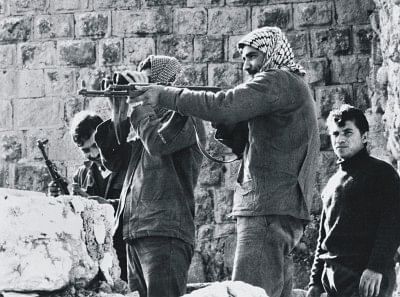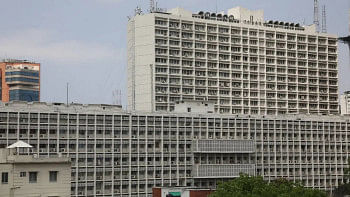Jordan, PLO turn page on 'Black September'

Palestinian armed fedayeen fighters kept a watch on the surroundings of the Ajloun castle where they had taken up position, on December 22, 1970, during the fights between the Jordanian army and Palestinian Fedayeen in the so-called Black September events. Armed conflict lasted until July 1971 and caused the death of thousands of Palestinians and the expulsion of the PLO and thousands of Palestinian fighters to Lebanon. Photo: AFP
Jordan and the Palestinians have turned the page on the bloody clashes of "Black September" that kicked off exactly 40 years ago on Friday but fears still remain in the absence of regional peace.
Estimates of the numbers killed in the 10 months of fighting that finally saw Jordan's army drive Palestinian fighters out of the country range widely, between 2,000 and 30,000. Palestinians have revised down the toll to 3,000.
Following the Arab defeat in the 1967 Six-Day War, Yasser Arafat, who later became Palestine Liberation Organisation (PLO) chief, saw in Jordan an ideal location for military bases for around 40,000 fighters to attack the neighbouring Jewish state.
But the power of the Palestinian armed groups developed into a state within a state.
On September 6, 1970, the leftist Popular Front for the Liberation of Palestine (PFLP) hijacked three passenger planes, two of which landed in Azraq, east of the capital Amman. Three days later a fourth plane was hijacked, with 56 British and US-Israelis citizens on board.
On September 17, Jordan's then king Hussein responded by ordering his army of 50,000 men to kick the Palestinian fighters out of the kingdom.
After 10 days of bloody fighting, during which Syria intervened to back the Palestinians, a ceasefire was signed in Cairo.
But the Palestinian armed groups got to stay in Jordan, and the fighting did not stop until prime minister Wasfi al-Tel drove the Palestinian fighters out of the country in July 1971.
Tel was assassinated four months later in Cairo by four members of the "Black September" organisation.
Jordanians have few regrets about the king's decision, however, in a country where around half of its 6.2 million people are now of Palestinian origin.
"It was not only inevitable but also necessary. If we did not act the way we did, it would have served the purpose of Israel of creating a Palestinian state in Jordan," said Adnan Abu Odeh, a confidant of king Hussein of Palestinian origin and information minister at the time of the fighting.
The two sides have officially turned the page on the "Black September" events.
In the 1980s, Arafat and king Hussein reconciled, although their relationship remained permanently tinged with suspicion, sources who were close to them say.
In 1988, Jordan relinquished its claim to the West Bank, which it had clung on to after Israel seized the territory in the 1967 war, and ceded it to Arafat's PLO.
Since King Abdullah II ascended the throne in 1999, he has stressed Jordan's support for Palestinian rights and called on Israel to commit itself to a two-state solution.
Jordan and the Palestinian Authority coordinate regularly, and King Abdullah was invited to Washington on September 2 to attend the resumption of direct peace negotiations.

 For all latest news, follow The Daily Star's Google News channel.
For all latest news, follow The Daily Star's Google News channel. 



Comments